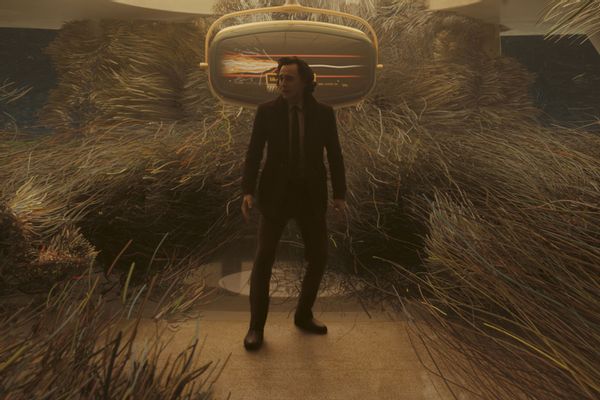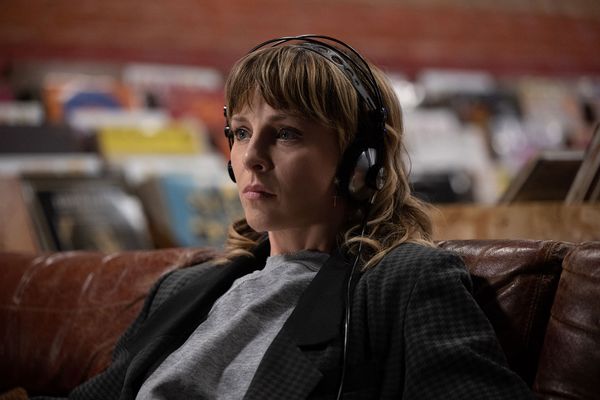“Loki” speaks to Marvel’s biggest concern – if only the studio will heed it
Isn’t it convenient when a Marvel TV show unintentionally summarizes the broader issues afflicting its larger universe? In Season 2 of “Loki,” Tom Hiddleston’s villain-turned-hero has done everything possible to stop the universe from coming undone only to witness his friends from the Time Variance Authority spontaneously spaghettify — and that’s a real astrophysical concept, by the way — moments before he can save them or anyone else.
Guiding his efforts in this second season, along with Owen Wilson’s Mobius, is Ke Huy Quan’s Ouroboros, the nerdy brainiac running the TVA’s Repairs and Advancement Department. Summing up everything that has happened since the premiere would barely make sense, but that’s not really necessary. All you need to know is that in the season’s penultimate episode “Science/Fiction,” when Loki encounters a version of Quan’s O.B. – who is a writer as well as a scientist – O.B. explains the difference between scientific theory and speculative storytelling, i.e. Marvel’s bread and butter.
“With science, it’s all what and how,” says O.B. “But with fiction, it’s why. So: why do you need to do this?”
O.B.’s talking about Loki’s mission to restore the universe’s tight, stable weave, but if you were to ask Marvel execs that question concerning their plan moving forward — Why do you need to churn out so much numbing content every year? — they probably wouldn’t have a defensible response.
At the close of “Science/Fiction,” Hiddleston’s Loki stumbled into a solution for this multiverse-ending problem that should explain everything — if the season’s creative propulsion holds. The (possibly) reformed trickster god seems to know what he’s doing, as does head writer Eric Martin and the rest of the folks running the show.
The same can’t be said of Marvel itself, according to a recent Variety story enumerating the disarray in Marvel’s business suites where executives have lost the thread due to the MCU’s overextension.
The company’s ills were, and are, a fiction problem – in that Marvel it bent on pushing out too much of it that isn’t worth our attention.
Future releases have been mapped out through 2026 and well into Phase Six — we’re in Phase Five now, in case you aren’t keeping track due to, you know, having a life — but the franchise’s box office returns are declining along with the product’s quality. Variety points to an array of problems – sloppy, poorly finished visual effects, flaccid scripts and a lack of solid direction from studio head Kevin Feige.
This isn’t news to consumers, who were already weighing whether paying to see its movies in theaters is worth the extra time and inconvenience when you can just wait and watch them at home. Accordingly, opening weekend expectations are low for “The Marvels,” which hits theaters Friday — hours after the “Loki” finale drops — and has a $250 million budget to make back.
“The Marvels” returns Brie Larson to the screen as Carol Danvers, but this time she’s joined by two characters who debuted in two of Marvel’s better TV shows. Iman Vellani’s Kamala Khan was introduced in 2022’s “Ms. Marvel,” and Teyonah Parris’ Monica Rambeau co-starred in “WandaVision,” the MCU’s first TV show.
“The Marvels” is expected to make between $60 million and $65 million (down from the previously projected $75 million and $80 million) on its opening weekend. In comparison “Captain Marvel” grossed $153.4 million over its opening weekend in 2019 and went on to top $1 billion in worldwide box office sales, becoming the first female-led superhero film to cross that threshold.
But that pre-dated Marvel’s TV aspirations and the release of “WandaVision,” which aspired to do more with the medium than simply extend another smash-and-shatter superhero yarn over multiple episodes. “WandaVision” is about a pair of superheroes who end up battling an existential evil, same as all superhero stories, except its world-ending adversary is grief. And it gifted us with the heartbreaking wisdom that defined grief as love persevering.
By the time “Ms. Marvel” came out, though, we’d been slammed with so many other angsty tales that fell short of that first series’ ingenuity that Vellani’s surefooted performance in “Ms. Marvel” and the incorporation of cultural legacy in her story was viewed by a comparatively smaller audience. That was less the fault of that show, which is quite entertaining, than Marvel’s inability to raise it above the glut of mediocrity surrounding it.
Another O.B. quote from “Science/Fiction” speaks to this: the company’s ills were, and are, a fiction problem – in that Marvel it bent on pushing out too much of it that isn’t worth our attention.
 Tom Hiddleston as Loki in “Loki” (Photo courtesy of Marvel Studios)If a culling is in the cards, as Variety’s insiders and other industry experts suggest, let’s hope “Loki” isn’t designated for pruning because it justifies its existence by functioning like a standalone TV show instead of a flimsy bridge to the next movie. Mind you, the shared quest in which Loki and Sylvie (Sophia Di Martino) embarked to establish their glorious purpose ended with meeting Jonathan Majors‘ Kang the Conqueror, aka, He Who Remains, who returns in this season as a late-19th century inventor named Victor Timely.
Tom Hiddleston as Loki in “Loki” (Photo courtesy of Marvel Studios)If a culling is in the cards, as Variety’s insiders and other industry experts suggest, let’s hope “Loki” isn’t designated for pruning because it justifies its existence by functioning like a standalone TV show instead of a flimsy bridge to the next movie. Mind you, the shared quest in which Loki and Sylvie (Sophia Di Martino) embarked to establish their glorious purpose ended with meeting Jonathan Majors‘ Kang the Conqueror, aka, He Who Remains, who returns in this season as a late-19th century inventor named Victor Timely.
Then it returned after a two-year absence with a storytelling jumble, but one guided by commanding, assured writing and an ensemble cast that commits to its oddity. When the second season debuted six weeks ago the question most asked revolved around Majors’ continued role in the show, along with a curiosity as to why Marvel continues to stick with him when his publicists, management firm and other film producers have parted ways with the actor.
“Loki” justifies its existence by functioning like a standalone TV show instead of a flimsy bridge to the next movie.
But in its execution “Loki” demonstrates that a skilled cast and capable writers can work a company-mandated guest star into its plot without surrendering its identity to that person and/or their character.
It dawns on Loki that salvation doesn’t rely on figuring out when or where to be, or why. “It’s about who,” he says. Marvel being Marvel, a betting person can guess the season’s outcome will present a way to undo everything that frayed into catastrophe at the end of last season by somehow changing the moment that altered everything. That’s a matter of following narrative schematics, something every show is obligated to do. Sophia Di Martino as Sylvie in “Loki” (Photo by Gareth Gatrell/Marvel Studios)
Sophia Di Martino as Sylvie in “Loki” (Photo by Gareth Gatrell/Marvel Studios)
Want more health and science stories in your inbox? Subscribe to Salon’s weekly newsletter The Vulgar Scientist.
What “Loki” achieves beyond that is something most Marvel content barely bothers with, which is to negotiate the lead character’s moral and emotional evolution over 12 hours instead of two. Against the smartest shows on TV, this observation is laughable, but “Loki” doesn’t need to compete with, say, “Drops of God.” It merely has to be more ambitious and engaging than most of what shares its superhero tent and creatively stalwart enough to finds its way apart from those other titles, which this second season hints that it can do.
This isn’t the work of any single character or actor, but a collaboration of performance, character nuance and a conscious emphasis on atmosphere. Loki isn’t the first Asgardian condemned to be human for a time, but between him and Thor, his journey to understanding what it means to be flawed, fallible and to need other people has been more gradual; that is the gift small-screen serialized storytelling affords a character’s evolution. It’s been satisfying to watch this play out in Hiddleston’s performance but also, in a more limited capacity, through Di Martino’s.
The scene that evokes this most poignantly wasn’t shot in some CGI-constructed TVA set but in a record store where Sylvie’s confident swagger is dissolved by a few strains of The Velvet Underground’s “Oh! Sweet Nuthin’” after a long work day that happens to be her last on Earth. Di Martino’s stricken expression says it all as Sylvie realizes her anarchic dedication to free will might cost her, and all of us, moments of simple sad beauty like that one.
Before Sylvie can surrender to that salubrious melody everything around her turns to noodles, a fate Loki realizes can only be avoided by rewriting the story, and maybe that’s a coded message from the writers to their overextended bosses. American cinema and the filmgoing audience would be better off with fewer Marvel titles flooding the entertainment space, certainly. But “Loki” reminds us we’re not wrong to believe some are capable of more than we’ve been trained to expect.
Read more
about this show and the MCU

